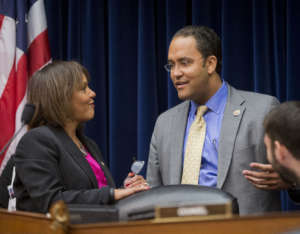

Reps. Will Hurd and Robin Kelly want a more coordinated effort around artificial intelligence to improve how agencies recruit and train cyber workers.
Artificial intelligence and the cyber workforce will be front and center when the House Oversight and Government Reform Subcommittee on IT comes back for the 116th Congress.
Both Reps. Will Hurd (R-Texas) and Robin Kelly (D-Ill.), currently the chairman and ranking member of the subcommittee, respectively, said they want to see progress across the government in both of these areas.

While it’s still unclear what the shape of the committee and subcommittees will look like and whether Hurd and Kelly will switch roles both say they plan to remain involved in federal IT and management issues.
Hurd said no matter how things come together, he will continue to work in a bipartisan fashion on IT oversight, starting with a focus on AI.
“We need a national AI strategy. Artificial intelligence matters because it will impact every single industry,” Hurd said on Ask the CIO. “Most immediately when it comes to cybersecurity, the future of cybersecurity will be good AI versus bad AI. We need to make sure we are aligning research in the federal government and the private sector, to make sure we are aligning the standards for the workforce and we are training the workforce of the future and we need to make sure we are working with our international partners on this … so we are driving how artificial intelligence and ethics of AI are in the future and not China.”
Kelly said she agreed with Hurd that agencies need to work with the private sector on investments and development of AI capabilities.
“We are seeing countries like China put far more investment into it than we have so I think we need to look at that,” she said. “I think hearing from agencies who are using it and whether there are pilots we can do in certain agencies.”
The executive branch already is busy looking at different aspects of AI. But Hurd is concerned there is a lack of coordination.
The Trump administration, for instance, created an AI task force in May under its Office of Science and Technology Policy.
The group plans to release an updated version of research and development strategy next spring. The Obama administration issued the first AI R&D strategy in 2016.
Additionally, the Defense Department, the Intelligence Community and the National Institute of Standards and Technology are all addressing challenges in the AI space from strategies to standards.
Hurd and Kelly say they would like to see many of those efforts come closer together to guard against duplication and potentially wasting money.
Along with AI, Hurd and Kelly said ensuring the federal workforce has the right skill sets, especially around cybersecurity is another big priority heading into 2019.
Hurd said he continues to work on his cyber national guard bill to make sure there is a pipeline of cyber experts for the future. Kelly said she supports that concept, but also would like to broaden the discussion about what it takes to attract and retain skilled workers.
“I’m also working with Rep. Bobby Scott (D-Va.), who is expected to be the chairman of the Education and Labor Committee, about what we can do vocationally to get folks up to speed and interested in the technology and cybersecurity world,” she said.
A third priority for Kelly is around the security of connected devices. She plans to introduce a bill to require basic cybersecurity standards to be baked into government-purchased Internet of Things (IoT) devices.
Kelly said with all the cyber attacks and vulnerabilities agencies are facing, it just makes sense for these products to have a baseline set of protections.


“Like with any bill whether it’s IoT or not, it’s important to bring people to table and listen to how they feel about it and what they think about it,” she said. “The thing I think about is what entities have to go through even already to protect themselves and how much money is spent to protect themselves. We are trying to be sensitive to that, but more needs to be done.”
Kelly added she would like to get the bill out of committee and get a vote from the full House. Sen. Mark Warner (D-Va.) introduced a similar bill in the upper chamber earlier this year.
Another key area that Hurd is watching closely to get out of Congress is new funding for the Technology Modernization Fund (TMF).
The House approved $150 million but the Senate zeroed it out in its initial version of the Financial Services and General Government appropriations bill for fiscal 2019.
Hurd said he is confident Senate lawmakers will go with the House’s version in the end.
“Senate appropriators were rightly upset with how OMB had been handling information around the TMF and that has been changed. OMB has made all the right changes so I think we will see Senate appropriators put some money into the TMF so we can continue to help all these agencies get to the point where they have resilient, nimble, modern infrastructure,” he said. “It’s an important tool for our CIOs and to modernize our systems. As we’ve found with [the Federal Information Technology Acquisition Reform Act], when you have prolonged oversight over a particular piece of legislation, you actually see it getting implemented and you actually see agencies responding.”
Copyright © 2025 Federal News Network. All rights reserved. This website is not intended for users located within the European Economic Area.
Jason Miller is executive editor of Federal News Network and directs news coverage on the people, policy and programs of the federal government.
Follow @jmillerWFED
